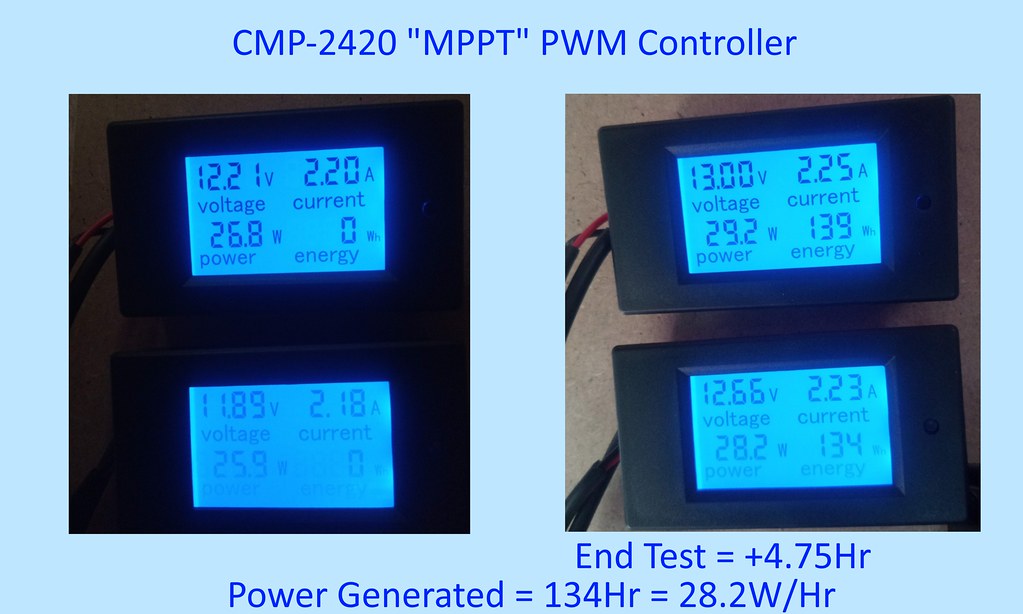wildebus
Forum Member
There are lots of different thoughts and opinions about the different flavours of Solar Controllers and the Pluses and Minuses of MPPT vs PWM models.
I thought I would actually test out a few controllers to see just what is what and how they really compare in reality.
I am not using actual solar panels for this testing as that will not provide a consistant power input to the controller under test. So instead I am using the following to provide the power:
1 x 9V 2A Transformer; 1 x 9V 2A Transformer; 1 x 9V 2.4A Transformer. I have wired these in series to give a Power Bank that supplies a 27V input with a current of around 2.1A - so a Wattage of 57W.
a regular 57W would not be a bad power level from say a 100W solar panel so represents a fair test in that respect. What this testing will not do is check one of the key features of the MPPT controller - the way it attempts to maximize the power in as the solar irradiation changes (the Maximum Power Point Tracking), but that is just for MPPT so is more for a test between different MPPT controllers so not a key factor for this test.
I have 5 different controllers I will be testing - 2 MPPT units and 3 PWM units. One of the MPPT units is a Victron Smart Solar and will be used as the benchmark as it is well known & respected and generally regarded as Best of Breed when it comes to Solar Controllers.
The Battery in the test is a slightly tired 75Ah Lead Acid Leisure Battery. I am commencing the test when the battery would be requiring a bulk charge and has the same (fairly minimal) load in it, so would be able to take for many hours the full 57W that the power bank could offer.
With the Power Bank proving a constant power (within the variances of transformers) and the Battery taking all it is offered, we can be pretty confident that any variances will be down to the Solar Controllers.
I have a Power Monitor on both the input and the output of the tested controller. This will tell me the Voltage, the Current and the Power in Watts both into the Controller and out to the Battery- and also the cumulative power (Wh) in and out over time
So Let's Get On It!
These are the Solar Controllers to be tested:

SC - Test Controllers by David, on Flickr
Test #1 - Venus MPPT 20A Controller (note the 'Venus' name has nothing to do with the Victron Venus)
This is the Controller. Physically very large. Well featured with temp probe for dynamic voltage adjustment once it gets to the Absorption Mode.
 SC - Venus_MPPT_20A by David, on Flickr
SC - Venus_MPPT_20A by David, on Flickr
The Test Results

SC - Venus_MPPT_20A - Test Results by David, on Flickr
Key Things to observe here:
The Input Monitor shows just what the Power Bank is providing - 27V and a current of 2.15A - 57.9W.
The Output shows the Battery level - 13.26V. And the key thing, which is a feature of the MPPT Controllers - the output current is raised above the input current (2.15A in, 4.08A out) so there is minimal power loss over the input - so with an input power of 57.9W, we get 54.1W out - an loss of around 7% (efficiency of 93%).
Test #2 - Venus PWM 30A Controller
This is the Controller.

SC - Venus_PWM_30A by David, on Flickr
The Test Results

SC - Venus_PWM_30A - Test Results by David, on Flickr
Now this is interesting
The MPPT Controller had an average power in of 51.3W/Hr over the test period. That is from a power input of 57W/Hr into the controller.
The PWM Controller in comparision had an average power in of 29.3W/Hr. That is just 57% percent of the power - a massive drop in performance.
What is the reason? PWM Controllers are unable to effectively convert excess voltage to extra current to maximise the power input. So when you look at the monitors you see the input voltage is cut to just above the battery voltage and the current in and out are pretty well the same.
If you didn't know otherwise, you might assume that the Solar Panel (the Power Bank in this case) is actually not putting out a higher voltage, but it definately is. And to confirm this, I disconnected the battery to get a truer picture of the input voltage ...
 SC -PWM No Battery by David, on Flickr
SC -PWM No Battery by David, on Flickr
So in essence, any voltage greater than around 1V more than the battery voltage is wasted.
A basic 12V Solar Panel has a Voltage of around 20V or so. as the battery voltage increases, more power is realises from the panel, but there is always a fair waste even when the battery is at is absorption level of around 14.4V.
I'll be carrying on the testing with the remaining controllers as further comparisions over the next few days (I need to leave the battery to drain off a bit overnight between each test), but the data so far to my mind actually suggests to me that an MPPT controller will be much better then generally thought with even the most basic panel.
Once I have completed the tests with the five controllers, I will repeat the test on an MPPT and a PWM controller, using a Power Bank input at 18V (so remove one of the transformers) to do a comparision at a level closer to the single 12V Solar Panel to see the difference.
I thought I would actually test out a few controllers to see just what is what and how they really compare in reality.
I am not using actual solar panels for this testing as that will not provide a consistant power input to the controller under test. So instead I am using the following to provide the power:
1 x 9V 2A Transformer; 1 x 9V 2A Transformer; 1 x 9V 2.4A Transformer. I have wired these in series to give a Power Bank that supplies a 27V input with a current of around 2.1A - so a Wattage of 57W.
a regular 57W would not be a bad power level from say a 100W solar panel so represents a fair test in that respect. What this testing will not do is check one of the key features of the MPPT controller - the way it attempts to maximize the power in as the solar irradiation changes (the Maximum Power Point Tracking), but that is just for MPPT so is more for a test between different MPPT controllers so not a key factor for this test.
I have 5 different controllers I will be testing - 2 MPPT units and 3 PWM units. One of the MPPT units is a Victron Smart Solar and will be used as the benchmark as it is well known & respected and generally regarded as Best of Breed when it comes to Solar Controllers.
The Battery in the test is a slightly tired 75Ah Lead Acid Leisure Battery. I am commencing the test when the battery would be requiring a bulk charge and has the same (fairly minimal) load in it, so would be able to take for many hours the full 57W that the power bank could offer.
With the Power Bank proving a constant power (within the variances of transformers) and the Battery taking all it is offered, we can be pretty confident that any variances will be down to the Solar Controllers.
I have a Power Monitor on both the input and the output of the tested controller. This will tell me the Voltage, the Current and the Power in Watts both into the Controller and out to the Battery- and also the cumulative power (Wh) in and out over time
So Let's Get On It!
These are the Solar Controllers to be tested:

SC - Test Controllers by David, on Flickr
Test #1 - Venus MPPT 20A Controller (note the 'Venus' name has nothing to do with the Victron Venus)
This is the Controller. Physically very large. Well featured with temp probe for dynamic voltage adjustment once it gets to the Absorption Mode.
 SC - Venus_MPPT_20A by David, on Flickr
SC - Venus_MPPT_20A by David, on FlickrThe Test Results

SC - Venus_MPPT_20A - Test Results by David, on Flickr
Key Things to observe here:
The Input Monitor shows just what the Power Bank is providing - 27V and a current of 2.15A - 57.9W.
The Output shows the Battery level - 13.26V. And the key thing, which is a feature of the MPPT Controllers - the output current is raised above the input current (2.15A in, 4.08A out) so there is minimal power loss over the input - so with an input power of 57.9W, we get 54.1W out - an loss of around 7% (efficiency of 93%).
Test #2 - Venus PWM 30A Controller
This is the Controller.

SC - Venus_PWM_30A by David, on Flickr
The Test Results

SC - Venus_PWM_30A - Test Results by David, on Flickr
Now this is interesting
The MPPT Controller had an average power in of 51.3W/Hr over the test period. That is from a power input of 57W/Hr into the controller.
The PWM Controller in comparision had an average power in of 29.3W/Hr. That is just 57% percent of the power - a massive drop in performance.
What is the reason? PWM Controllers are unable to effectively convert excess voltage to extra current to maximise the power input. So when you look at the monitors you see the input voltage is cut to just above the battery voltage and the current in and out are pretty well the same.
If you didn't know otherwise, you might assume that the Solar Panel (the Power Bank in this case) is actually not putting out a higher voltage, but it definately is. And to confirm this, I disconnected the battery to get a truer picture of the input voltage ...
 SC -PWM No Battery by David, on Flickr
SC -PWM No Battery by David, on FlickrSo in essence, any voltage greater than around 1V more than the battery voltage is wasted.
A basic 12V Solar Panel has a Voltage of around 20V or so. as the battery voltage increases, more power is realises from the panel, but there is always a fair waste even when the battery is at is absorption level of around 14.4V.
I'll be carrying on the testing with the remaining controllers as further comparisions over the next few days (I need to leave the battery to drain off a bit overnight between each test), but the data so far to my mind actually suggests to me that an MPPT controller will be much better then generally thought with even the most basic panel.
Once I have completed the tests with the five controllers, I will repeat the test on an MPPT and a PWM controller, using a Power Bank input at 18V (so remove one of the transformers) to do a comparision at a level closer to the single 12V Solar Panel to see the difference.
Last edited:








 SC - Venus_PWM_20A - Test Results
SC - Venus_PWM_20A - Test Results